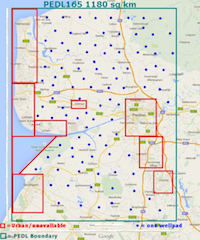Professor Mike Stephenson’s Lecture contd.
After Professor Mike Stephenson’s talk at Lancaster Radio Lancashire undertook a Vox Pop which seems to pretty much accord with our correspondent’s report. Those interviewed remained unconvinced by Professor Stephenson’s attempts to convince us that fracking is safe.
This was broadcast on Graham Liver’s programme on Radio Lancashire the next day. What is quite telling is that all three of those interviewed were obviously unconvinced by the message that fracking is “safe”.
A little later on he interviewed the Professor himself and then spoke to Bob Dennett of RAFF.
Professsor Mike Stephenson and Bob Dennett of RAFF
Professor Stephenson clearly states in this interview:
“what we are doing is a baseline study of natural water in waterwells. The idea is to find out what the condition of the water is before anything happens – I mean nothing may happen but if it does we can be sure of what the original condition of water was, so that if for example, if there’s a problem, let’s say you know a company is extracting shale gas and there’s a problem with the water then we’ll know quickly and we’ll be able to trace it to the activities so this is a kind of check if you like on what’s going on”
This sounds quite convincing doesn’t it?
We have to wonder whether the Professor is not actually aware that one of his colleagues has stated publicly that the baseline study will not include Cuadrilla’s sites in Lancashire.
However, according to Dr. Rob Ward, head of groundwater science at the BGS, the study will not include Cuadrilla’s existing sites despite its use of fracking to determine its estimate of 200 trillion cubic feet for gas in place in the Bowland Shale. “We are not testing those specific areas,” he told Millicent Media. ”At the moment [Cuadrilla] is not exploiting shale gas, it has only drilled exploratory wells. This is a strategic survey to build up a national baseline against which environmental impacts can be assessed and appropriate management decisions taken if large-scale exploitation goes ahead.”
The British Geological Survey’s (BGS) study to establish levels of methane in groundwater in the UK will not include sites ‘fracked’ by Cuadrilla Resources in Lancashire.
http://millicentmedia.com/2012/03/07/british-geological-surveys-shale-gas-groundwater-study-to-omit-cuadrillas-fracking-sites/
It seems bizarre that he should pontificate about something like this with such certainty but not in fact know what his own organisation is up to (or perhaps that should be not up to) in such a crucial area. This does not instil confidence in anything else he might share with us does it? (Unless of course it was his colleague at the BGS who was wrong?)
Edit: And now we know. One of our supporters asked the question of whether the baseline studies would be done in Lancashire and got a rather equivocal answer from the Professor at the meeting so she followed it up. This is the response that she got from Dr Rob Ward.
Mike Stephenson has passed your enquiry on to me. The methane baseline survey is being managed by the BGS Groundwater Science programme. You can find further details of the study and a map of the areas we are covering on our website (http://www.bgs.ac.uk/research/groundwater/quality/methane_baseline_survey.html). The objective of the study is to carry out a regional scale baseline survey in areas that may potentially be explored for shale gas. This includes Lancashire and therefore the general area in which Cuadrilla is operating. However we are not specifically targeting locations close to their operations as this is a regional survey. The selection of monitoring sites is dependent on the availability of existing suitable groundwater monitoring sites or groundwater abstractions and permission from the owner. Further details can be found on the web pages.
(our emphasis)
So we will have a baseline study, but it just won’t be in the specific sites where it might actually be useful “if for example, if there’s a problem, let’s say you know a company is extracting shale gas and there’s a problem with the water then we’ll know quickly and we’ll be able to trace it to the activities so this is a kind of check if you like on what’s going on“.
Of course we also need to bear in mind that the baseline study is only really much use in case of an issue if the perpetrators are still around. If a problem is discovered after well abandonment it will just tell us who was to blame. The company concerned may not even still exist at that point.





























